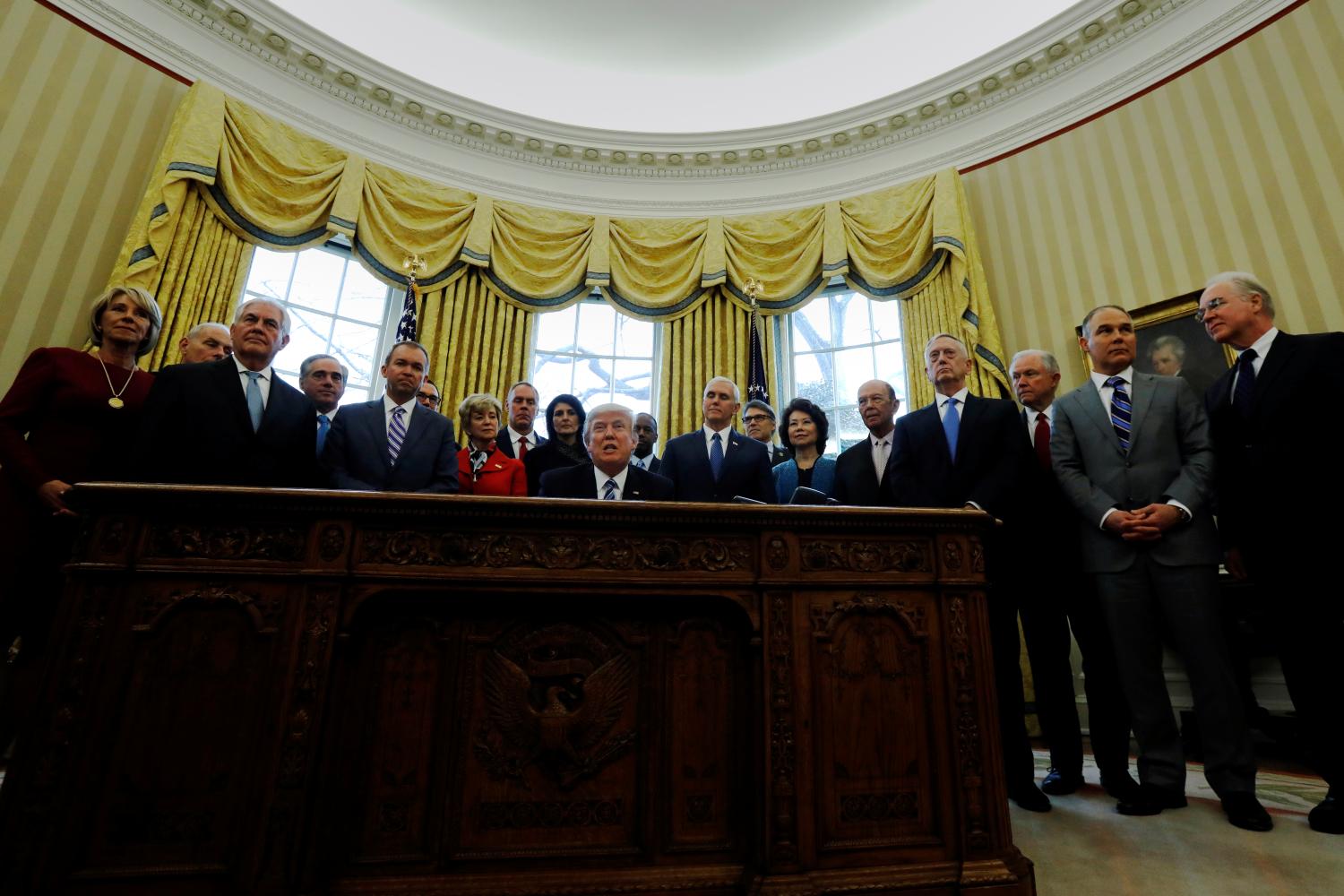Administrators of the U.S. Environmental Protection Agency have long been on the receiving end of litigation. Indeed, former Administrator Lee Thomas used to joke that he had a hard time getting a house mortgage after stepping down from his Reagan-era duties because his name appeared on so many suits against EPA.
Perhaps EPA incumbent Gina McCarthy will have a similar issue when her service ends with the upcoming presidential transition. If so, a good deal of the litigation filed against the agency during her tenure will bear the imprint of her likely successor, Oklahoma Attorney General Scott Pruitt, who has been nominated by President-elect Donald Trump.
EPA has a long history of administrators with extensive state government experience, ranging from founding head William Ruckelshaus to McCarthy. But Pruitt represents the first state attorney general to vault into the lead role at EPA, though he has also been a career politician with extensive experience in the state legislature in Oklahoma City.
State attorneys general tend to be highly ambitious politically and often use their post to seek higher office. Think former Arkansas AG Bill Clinton or Alabama AG Jeff Sessions. Pruitt, their Oklahoma neighbor, now follows this path.
Many state AGs seek political visibility through aggressive policy engagement within their state, often using investigative or litigative powers to examine wrongdoing at home. But Pruitt has largely eschewed this in favor of a strategy to express outrage against regulatory decisions taken by EPA and related federal agencies.
He has specialized in getting to the microphone quickly and launching litigative assault, whether the issue involved climate, water, or oil and gas development. His common refrain has been that EPA has overreached its statutory authority and encroached on state policy terrain.
It is not clear that this approach has had much success in the courts but it has built him a broad following in the energy production industry and in conservative circles. Oklahoma has recently been selected by the Fraser Institute as the most attractive government in the world to pursue oil and natural gas investment.
This reputation has been built on a series of actions from respective legislators and governors and industry-friendly state agencies but also kindly treatment from the attorney general. Oklahoma has been at the literal epicenter of the growing global debate about earthquakes linked to injection of oil and gas wastes back into the ground after extraction via fracking.
The state averaged one to three quakes per year from 1974 through 2008 but has since experienced exponential growth in the number of these episodes, reaching a record 903 last year.
Most of these have been relatively modest, though there has also been an uptick in the number exceeding magnitude 3, including a 5.8 event near Pawnee in September that damaged buildings near the state’s major oil pipeline hub.
Pruitt and other state leaders have been remarkably slow to acknowledge this pattern or its link with expanded oil and gas activity. They have struggled mightily to develop any serious plan to address this issue, quietly siding with those who either deny the problem (T. Boone Pickens: “Earthquakes my ass.”) or expect it to fade over time.
The state has experienced considerable increase in use of renewables, particularly its exceptional wind potential. Most of its neighboring states, including Texas, have more robust policies that encourage the development of renewables and expand transmission capacity, however.
But Pruitt will likely soon leave this cozy base of operation, receiving praise from oil and gas producers while heaping invective on the EPA and the staff that he may soon lead. It is highly unclear, however, just what he will do in his role, especially following decades of political inability to revise popular and durable environmental statutes addressing air and water quality. He will have to confront issues that range from vehicle emission standards to preventing oil spills and future Flints. There may be real limits to simply saying that state and local governments should do whatever they deem best.
One guide may be the most controversial EPA head, Anne Gorsuch, who served during the very early years of the Reagan Administration. Gorsuch had previously been a stalwart critic of the agency, from her seat in the Colorado legislature. She essentially tried to dismantle the agency, undertaking a major set of transitions by concentrating power very close to her office and engaging in quiet conversations with regulated industry over regulatory backpedaling.
Of course, this only lasted a relatively short time. Gorsuch badly overplayed her hand and stumbled on issues like phasing out lead from gasoline and cleaning up toxic sites. Under siege by Congress, the Reagan Administration ultimately threw her under the bus long before she could become a re-election liability. Gorsuch was replaced with an emergency pinch-hit by the more experienced and less combustive Ruckelshaus and then Thomas, who was more focused on agency management than making headlines.
It is not at all clear whether Pruitt will follow the Gorsuch path or break new ground. But he will soon lose his most familiar option, heading to the microphones to denounce and then sue the Environmental Protection Agency.
The Brookings Institution is committed to quality, independence, and impact.
We are supported by a diverse array of funders. In line with our values and policies, each Brookings publication represents the sole views of its author(s).









Commentary
What will Scott Pruitt do if he cannot sue EPA?
December 9, 2016